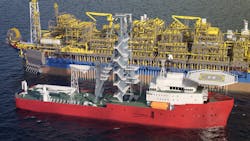Strohm developing long-life flowlines, risers for Brazilian pre-salt fields
Offshore staff
IJMUIDEN, the Netherlands – Strohm (ex-Airborne Oil & Gas) has entered a JIP with Petrobras and Shell for its thermoplastic composite pipe (TCP) flowline and riser technology.
The aim is to develop deepwater flowlines and risers for fields offshore Brazil that are corrosion-free, with a 30-year design life.
Brazil’s pre-salt deepwater fields have some of the world’s most productive wells and are typically produced through dynamic risers connected to FPSOs.
But according to Strohm, conventional flexible flowline and risers have been exhibiting premature integrity issues caused by corrosion, leading to the need for regular replacements that in turn causes deferred production.
The TCP flowline and riser is said to provide a superior fatigue performance and is light weight compared to steel, permitting a cost-effective, free-hanging catenary configuration.
Under the new JIP Strohm will develop, qualify, and test its composite pipe technology with the two operators to ensure it is fully field-proven and commercially available to the industry.
Two TCP prototype systems will be manufactured and installed, one each for flowlines and risers, the aim being to mature the technology to TRL-6 (API 17N), i.e. ready for deployment.
Strohm CEO Oliver Kassam, said the prototype should be installed in deepwater by 2024.
Brazil currently invests around $1 billion annually in risers to support new FPSO operations, he added, a figure which will likely rise as the country becomes the world’s fourth largest oil producer by 2029.
The TCP riser is spoolable and prepared in long lengths, resulting in lower transportation and installation costs, the company claims. It can be installed using existing vessels and does not require buoyancy elements during installation. It is also said to be fully recyclable.
Henk de Boer, Strohm’s chief technology officer, said: “We’ve worked closely with Petrobras and Shell to understand their requirements for installation, subsea configuration as well as fluids, pressures and design life requirements.”
Engineering and pipe testing will be performed in the Netherlands and Brazil, with full-scale prototypes manufactured in Brazil prior to offshore installation. Strohm’s shareholders are Aker Solutions, Chevron Technology Ventures, Evonik Venture Capital, Saudi Aramco Energy Ventures, Shell Ventures, Subsea 7, Sumitomo Corp., and the private equity investor, HPE Growth.
08/25/2021

